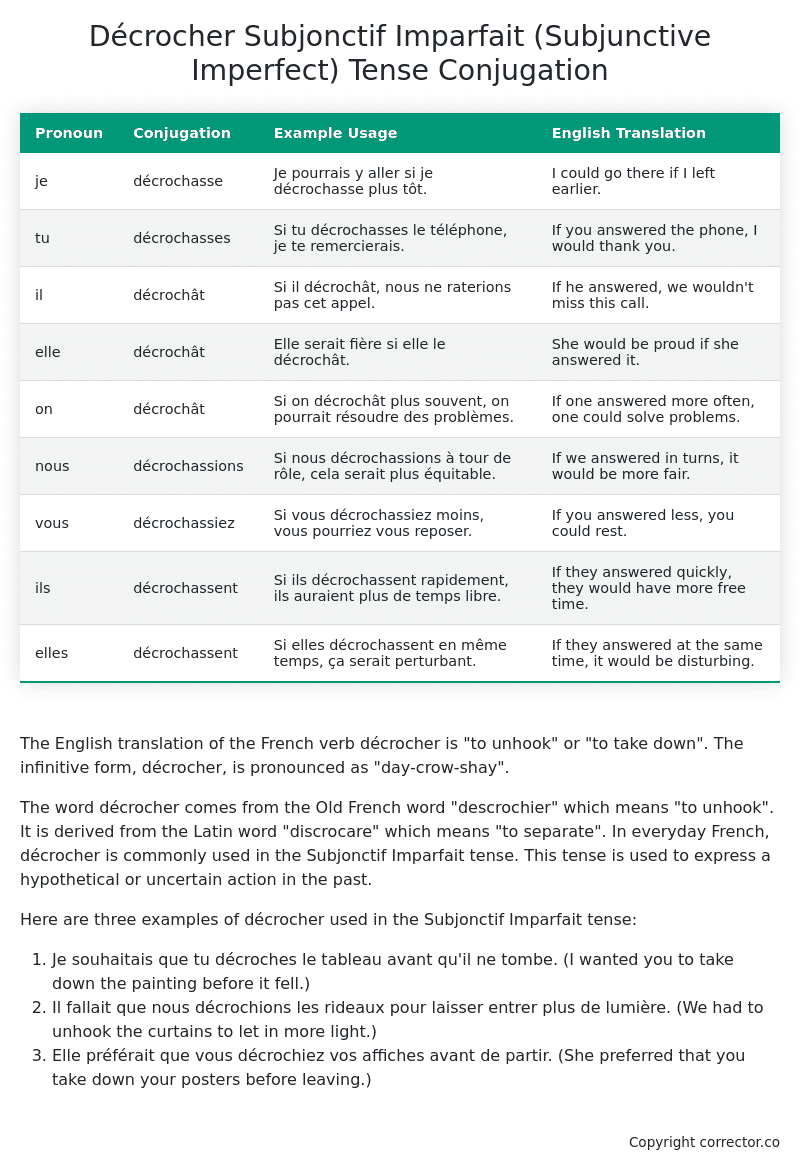Subjonctif Imparfait (Subjunctive Imperfect) Tense Conjugation of the French Verb décrocher
Introduction to the verb décrocher
The English translation of the French verb décrocher is “to unhook” or “to take down”. The infinitive form, décrocher, is pronounced as “day-crow-shay”.
The word décrocher comes from the Old French word “descrochier” which means “to unhook”. It is derived from the Latin word “discrocare” which means “to separate”. In everyday French, décrocher is commonly used in the Subjonctif Imparfait tense. This tense is used to express a hypothetical or uncertain action in the past.
Here are three examples of décrocher used in the Subjonctif Imparfait tense:
- Je souhaitais que tu décroches le tableau avant qu’il ne tombe. (I wanted you to take down the painting before it fell.)
- Il fallait que nous décrochions les rideaux pour laisser entrer plus de lumière. (We had to unhook the curtains to let in more light.)
- Elle préférait que vous décrochiez vos affiches avant de partir. (She preferred that you take down your posters before leaving.)
Table of the Subjonctif Imparfait (Subjunctive Imperfect) Tense Conjugation of décrocher
| Pronoun | Conjugation | Example Usage | English Translation |
|---|---|---|---|
| je | décrochasse | Je pourrais y aller si je décrochasse plus tôt. | I could go there if I left earlier. |
| tu | décrochasses | Si tu décrochasses le téléphone, je te remercierais. | If you answered the phone, I would thank you. |
| il | décrochât | Si il décrochât, nous ne raterions pas cet appel. | If he answered, we wouldn’t miss this call. |
| elle | décrochât | Elle serait fière si elle le décrochât. | She would be proud if she answered it. |
| on | décrochât | Si on décrochât plus souvent, on pourrait résoudre des problèmes. | If one answered more often, one could solve problems. |
| nous | décrochassions | Si nous décrochassions à tour de rôle, cela serait plus équitable. | If we answered in turns, it would be more fair. |
| vous | décrochassiez | Si vous décrochassiez moins, vous pourriez vous reposer. | If you answered less, you could rest. |
| ils | décrochassent | Si ils décrochassent rapidement, ils auraient plus de temps libre. | If they answered quickly, they would have more free time. |
| elles | décrochassent | Si elles décrochassent en même temps, ça serait perturbant. | If they answered at the same time, it would be disturbing. |
Other Conjugations for Décrocher.
Le Present (Present Tense) Conjugation of the French Verb décrocher
Imparfait (Imperfect) Tense Conjugation of the French Verb décrocher
Passé Simple (Simple Past) Tense Conjugation of the French Verb décrocher
Passé Composé (Present Perfect) Tense Conjugation of the French Verb décrocher
Futur Simple (Simple Future) Tense Conjugation of the French Verb décrocher
Futur Proche (Near Future) Tense Conjugation of the French Verb décrocher
Plus-que-parfait (Pluperfect) Tense Conjugation of the French Verb décrocher
Passé Antérieur (Past Anterior) Tense Conjugation of the French Verb décrocher
Futur Antérieur (Future Anterior) Tense Conjugation of the French Verb décrocher
Subjonctif Présent (Subjunctive Present) Tense Conjugation of the French Verb décrocher
Subjonctif Passé (Subjunctive Past) Tense Conjugation of the French Verb décrocher
Subjonctif Imparfait (Subjunctive Imperfect) Tense Conjugation of the French Verb décrocher (this article)
Subjonctif Plus-que-parfait (Subjunctive Pluperfect) Tense Conjugation of the French Verb décrocher
Conditionnel Présent (Conditional Present) Tense Conjugation of the French Verb décrocher
Conditionnel Passé (Conditional Past) Tense Conjugation of the French Verb décrocher
L’impératif Présent (Imperative Present) Tense Conjugation of the French Verb décrocher
L’infinitif Présent (Infinitive Present) Tense Conjugation of the French Verb décrocher
Struggling with French verbs or the language in general? Why not use our free French Grammar Checker – no registration required!
Get a FREE Download Study Sheet of this Conjugation 🔥
Simply right click the image below, click “save image” and get your free reference for the décrocher Subjonctif Imparfait tense conjugation!

Décrocher – About the French Subjonctif Imparfait (Subjunctive Imperfect) Tense
Formation
Common Everyday Usage Patterns
Interactions with Other Tenses
Subjonctif Présent
Indicatif Passé Composé
Conditional
Conditional Perfect
Summary
I hope you enjoyed this article on the verb décrocher. Still in a learning mood? Check out another TOTALLY random French verb conjugation!


